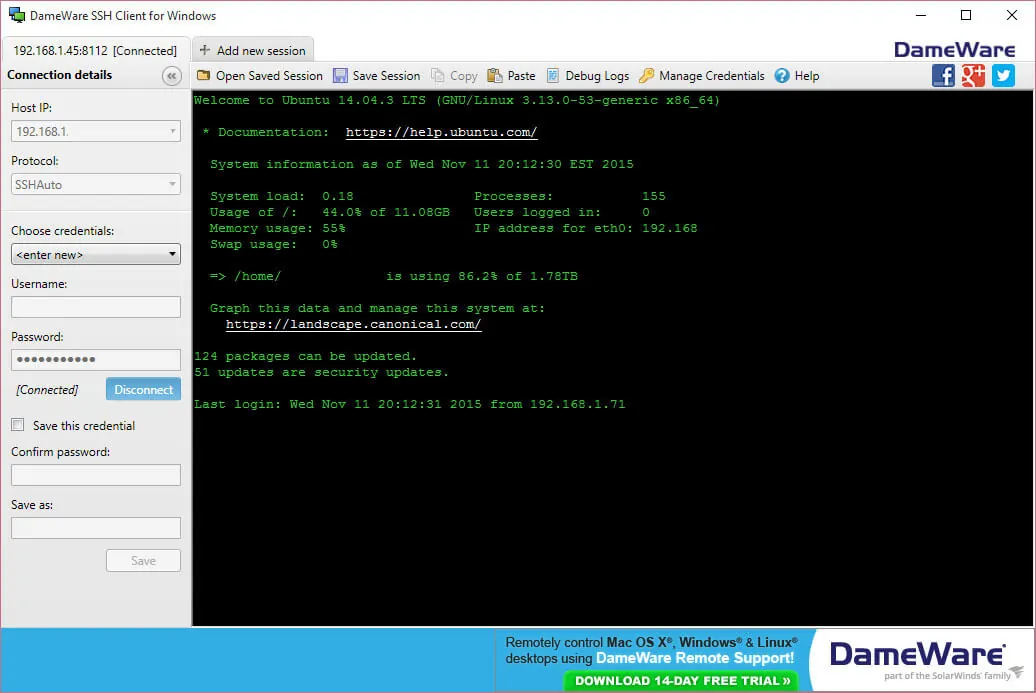

- #SSH CLIENT FOR MAC .PEM TERMINAL HOW TO#
- #SSH CLIENT FOR MAC .PEM TERMINAL INSTALL#
- #SSH CLIENT FOR MAC .PEM TERMINAL UPDATE#
- #SSH CLIENT FOR MAC .PEM TERMINAL SOFTWARE#
- #SSH CLIENT FOR MAC .PEM TERMINAL CODE#
Now open a new Terminal on your local machine and confirm that you can login as the new user: $ ssh -i trevors-key-pair.pem SuccessĪnd that is it. ssh $ touch authorized_keys $ chmod 600 authorized_keysĪt this point we need the public key content from earlier.Ĭopy that content and paste it into the authorized_keys file, and save it. Now create a file inside this folder called “authorized_keys” and set its permissions: $ cd. On Linux and MacOS, this generates an SSH key in RSA format.
#SSH CLIENT FOR MAC .PEM TERMINAL UPDATE#
Once created, we then login as this user: $ sudo su - trevorĬreate a hidden folder called “ssh” and update its permissions so that only “trevor” can access it: $ mkdir. In this case, the SSH server is the Git server and the SSH client is the Jira server. my-ec2-keypair.pem let’s create a new user, called “trevor”: $ sudo adduser trevor Start by connecting to your EC2 instance again (like you did in Step 3): $ ssh -i. The public key content will be output to the Terminal. To do this, we need to change the file’s permissions to be read-only: $ chmod 400 trevors-key-pair.pemĪnd then we can use the ssh-keygen tool to extract the public key: $ ssh-keygen -y -f trevors-key-pair.pem For example, if you saved your key to your home directory as mykey.pem, to connect to the computer with IP address 123.123.123. To use the SSH client, open the terminal by going to Applications -> Utilities -> Terminal. Now we need to extract the public key from it. Mac (OS X) OS X already has an SSH client built-in, so there is nothing to install. Once you create it, it will download the private key to your local machine.
#SSH CLIENT FOR MAC .PEM TERMINAL CODE#
Then type the following code in the terminal. alternatively, you can drag the folder to the terminal icon on the dock it will open in a new window. Click “Create key pair” and name the key pair something like “trevors-key-pair” First, we need to mount the folder where keys are saved in the terminal, for that you can type cd then type the path of the folder.In the AWS console, go to EC2, and go to “Key Pairs”.Let’s start by generating a new key pair specifically for this user: We’re going to create an EC2 user called trevor for use with Trevor.io so that we don’t have to share the ec2-user credentials with a 3rd party. Database: the name of the database to connect to (MySQL calls this your schema).Password: the password for your database user.User: the username for your database user.Database Port: the “Port” for your RDS database.Database Host: the “Endpoint” for your RDS database.
#SSH CLIENT FOR MAC .PEM TERMINAL HOW TO#
SSH User: ec2-user (in step 4 below we show how to create a custom user to use instead).


Now paste the content of cat ~/.ssh/god.pub into the authorized_keys file and do not forget to add the username at the end. You can also refer to the link to get more idea.
#SSH CLIENT FOR MAC .PEM TERMINAL SOFTWARE#
I cannot use 3rd party software to make the ssh connection - don't ask, this is a client rule, it's beyond my control no matter how weird. pem) so I can ssh using Terminal with only the file and info I got. Host godsAws HostName 199.213.178.104 User god IdentityFile ~/.ssh/god I need to know exactly what steps to take (idiot proof please) to setup on my mac (i.e. Note: HostName is the public IP address of the AWS Linux instance.
#SSH CLIENT FOR MAC .PEM TERMINAL INSTALL#
Note: Please install ssh-keygen if not already installed.


 0 kommentar(er)
0 kommentar(er)
